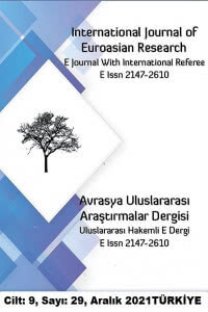1901 Depreminde Erzurum Valisi Nazım Bey’in Afet Yönetim Stratejileri
Bir deprem bölgesi olan Erzurum, geçmişten günümüze pek çok yer sarsıntısına şahit oldu. Bunlardan bazıları, hafif atlatılırken bazıları ise afetten felakete dönüştü. Bu makalede 8 Kasım 1901 tarihinde Erzurum’da meydana gelen deprem konusu ele alındı. Depremin merkez üssü, afetin boyutu, artçı sarsıntılar, halk arasında yaşanan korkular ile panik ve bunlardan kaynaklı krizin yönetim biçimi incelendi. Depremin şehrin sosyoekonomik yapısına etkisi ele alındı. Afet yönetimi ilkeleri ve teorilerinden bahsedilerek, söz konusu deprem örneğinde, teorinin pratiğe dönüşüm aşamaları üzerinde duruldu. Bu bağlamda Erzurum Valisi Nazım Bey’in edindiği tecrübeler ışığında afeti yönetme stratejileri değerlendirildi. Deprem anı ve sonrasında yaptığı faaliyetler, karar verme, yönetim ve ekonomik temelli teoriler çerçevesinde değerlendirildi. Depremzedelerin zor koşullar altında hayata tutunma çabaları hakkında bilgi verildi. Depremin eğitim, sağlık, mali ve askeri alanlara verdiği zararların boyutları ortaya konuldu. Devletin iyileştirme politikaları, felaketzedelere verdiği ekonomik destekler ile felaket sonrası hasar tespit çalışmaları, yardımların organizesi, imar ve inşa faaliyetlerinin durumu incelendi. Vali Nazım Bey’in kaynak tahsis yöntemleri değerlendirildi. Erzurum hapishanesinde çıkan kargaşanın yatıştırılma biçimi ve bu süreçte toplumsal barışın sürekliliği için alınan önlemler üzerinde duruldu. Gerek yardımların dağıtımı, gerek onarım ve inşa süreçlerinde, toplumsal sınıfların beklentileri dikkate alınarak yapılan uygulamalara değinildi. Depremde yararlılık gösterenlere verilen ödüller hakkında bilgi verildi. Nazım Bey, genel olarak bakıldığında afet anı ve sonrası süreçte afet ve kriz yönetiminde büyük bir başarı gösterdi. Daha çok günümüzde dikkat çekilen afet öncesi hazırlık aşamasına dair herhangi bir çalışması tespit edilemedi. Komutayı ele alışı, halkla doğrudan temas ve iletişimi, ilkyardım faaliyetleri, organizeli çalışma prensipleri onu afet yönetiminde başarılı kılan icraatlardı.
Disaster Management Strategies of Erzurum Governor Nazim Bey in The 1901 Earthquake
Erzurum, which is an earthquake zone, has witnessed many earthquakes from past to present. Some of them were mildly circumvented, while others turned from natural disaster to catastrophe. In this article, the earthquake that took place in Erzurum on 8 November 1901 was evaluated. The epicenter of the earthquake, the extent of the disaster, aftershocks, fears among the people and panic and the management of the crisis arising from them were examined. The effect of the earthquake on the socio-economic structure of the city was discussed. The disaster management principles and theories were mentioned, and the stages of transforming the theory into practice during the earthquake were emphasized. In this context, the disaster management strategies were evaluated in the light of the previous experiences of Erzurum Governor Nazım Bey. His activities during and after the earthquake were evaluated within the framework of decision-making, management and economic-based theories. Information was given about the earthquake victims’ struggle to hold on to life under difficult conditions. The extent of the damage caused by the earthquake to the services of education, health, financial and military was revealed. The state's recovery policies, economic support to the victims of disaster, the post-disaster damage assessment studies, aid organization, zoning and construction activities were examined. Governor Nazım Bey's resource allocation methods were evaluated. The way in which the turmoil in Erzurum prison was settled and the measures taken for the continuity of social peace in this process were emphasized. The applications made by taking into account the expectations of social classes in the distribution of aid, repair and construction processes were mentioned. Information was given about the awards given to those who showed usefulness in the earthquake. In general, Nazım Bey showed great success in disaster and crisis management during and after the disaster. No studies on the pre-disaster preparedness phase, which is more noticeable today, could not be identified. His handling of command, direct contact and communication with the public, first aid activities, and organized working principles were the actions that made him successful in disaster management.
___
- BOA. Babıali Evrak Odası (BEO): 1726/129447, 1745/130829, 1749/131101, 1749/131102, 1749/131110, 1749/131173, 1752/131382, 1770/132695, 1797/134755, 2557/191733.
- Dahiliye Nezareti Mektubi Kalemi (DH.MKT): 463/27, 909/59, 2556/114, 2558/104, 2561/113, 2561/114, 2567/78, 2569/57, 2570/82, 2570/102, 2571/59, 2573/4, 2574/107, 2578/41, 2578/123, 2594/35, 2596/28, 2596/73, 2598/123, 2599/25.
- Dahiliye Şifre Kalemi (DH.ŞFR): 273/88.
- Dahiliye Nezareti Tesri-i Muamelat ve Islahat Komisyonu (DH.TMIK.M): 113/51, 114/8, 114/27, 115/7.
- İrade Adliye ve Mezahib (İ.AZN): 47/36.
- İrade Askeri (İ.AS): 45/45.
- İrade Hususi (İ.HUS): 91/55, 91/61, 95/32.
- İrade Dahiliye (İ.DH): 1388/11, 1394/27.
- İrade Rüsumat (İ.RSM): 15/17.
- İrade Ticaret ve Nafia (İ.TNF): 10/40.
- Maarif Nezareti Mektubi Kalemi (MF.MKT): 591/15, 600/3, 617/23.
- Şura-yı Devlet (ŞD): 1522/11, 1525/1.
- Yıldız Mütenevvi Maruzat (Y.MTV): 223/34, 254/113.
- Yıldız Perakende Evrakı-Umum Vilayetler Tahrirât (Y.PRK.UM): 56/94, 56/130, 57/10, 64/29.
- Cevizliler, Erkan, Ali Servet Öncü. 2013. “Erzurum Valisi Mustafa Nazım Bey’in Vilayetteki Çalışmalarına Dair Raporu (1905)”. History Studies 5(1): 71-88.
- Kyoo Man Ha. 2020. “Disaster Management: From a one sided approach to an inclusive system”. Environment Systems and Decisions 40: 403-412.
- Özer, Çağlar, Erdem Bayrak. 2021. Köprüköy Depremleri Jeofizik (Sismolojik-Sismotektonik) Raporu. Erzurum: Atatürk Üniversitesi Deprem Araştırma Merkezi Yayınları.
- Sementelli, Arthur J. 2007. “Toward a Taxonomy of Disaster and Crisis Theories”. Administrative Theory and Praxis 2 (4): 497-512.
- Tozlu, Selahattin. 2001. “Erzurum Tarihinde Depremler”. Tarih Boyunca Anadolu’da Doğal Afetler ve Deprem Semineri 22-23 Mayıs 2000. İstanbul: Globus Dünya Basımevi.
- Tyagi, Aditi. 2010. “Need for Paradigm Shift in Approach to Disaster Management”. The Indian Journal of Political Science, 71 (1): 9-23.
